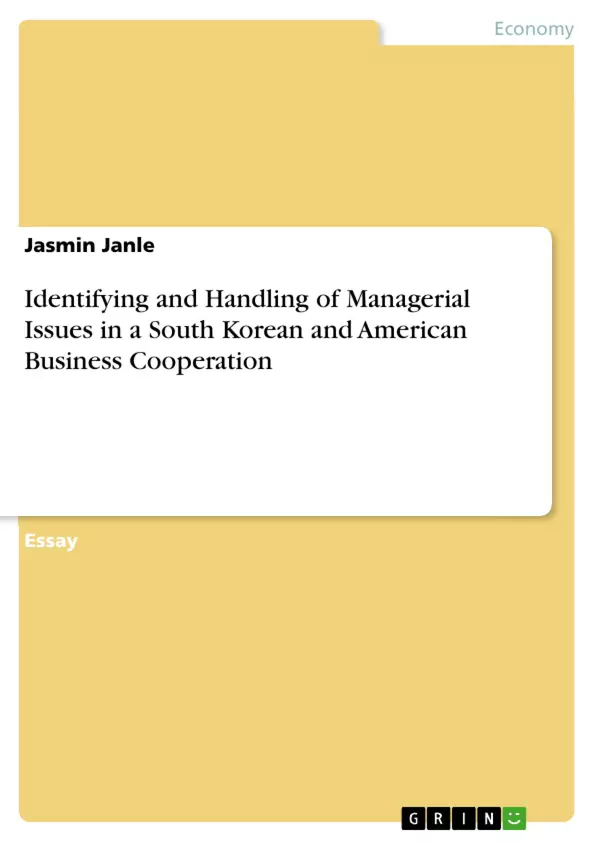This work will focus on a South Korean and American business cooperation. "Knowledge is power when it comes to global business" (Steers, 2017). Keeping that statement in mind, the objective of the following essay is to transfer and strengthen the knowledge about cross-cultural theories and dimensions in order to benefit from global business.
The comparative analysis of those countries is highly correlated to the context of global management and divided as follows: In the first part, the cultural environment and key national cultural differences will be illustrated. Based on those identified differences, potential managerial issues driven by situational contingencies in business context will be highlighted in the second part. The third part of the analysis will focus on ways in overcoming those cross-cultural issues in order to benefit from this specific cross-cultural cooperation.
Inhaltsverzeichnis (Table of Contents)
- Introduction
- Comparative Analysis
- Contrasting key national cultural differences
- Identifying potential managerial issues in business context
- Recommending ways in managing cross-cultural issues
Zielsetzung und Themenschwerpunkte (Objectives and Key Themes)
The essay's objective is to enhance understanding of cross-cultural theories and dimensions in the context of a South Korean and American business cooperation. This is achieved through an analysis of key national cultural differences, potential managerial issues arising from those differences, and strategies for managing cross-cultural challenges. The essay aims to benefit from a global business perspective and contribute to successful cross-cultural cooperation.
- Cultural differences between South Korea and the United States
- Potential managerial issues stemming from cultural disparities
- Strategies for managing cross-cultural issues in business settings
- The importance of understanding cultural context in international business
- The role of cultural sensitivity in fostering effective collaboration
Zusammenfassung der Kapitel (Chapter Summaries)
- Introduction: The introduction establishes the essay's objective of examining cross-cultural dimensions in a South Korean and American business partnership, highlighting the significance of cultural understanding in global business.
- Comparative Analysis: This section delves into contrasting key cultural differences between South Korea and the United States, focusing on power distribution, uncertainty and social control, and work patterns and work-environmental relationships. The analysis highlights the cultural dimensions that may contribute to potential managerial issues in a business context.
- Contrasting key national cultural differences: This chapter explains the concept of culture and its importance in managerial contexts. Using Hofstede's definition of culture, the chapter explores key cultural differences between South Korea and the United States, focusing on three specific dimensions: power distance, uncertainty avoidance, and work patterns/relationships.
- Identifying potential managerial issues in business context: Building upon the cultural differences explored in the previous chapter, this section identifies potential managerial issues that could arise in a South Korean-American business partnership. The focus is on the impact of different conceptions of power distribution, trust building, and work patterns on team dynamics and negotiations.
Schlüsselwörter (Keywords)
The central keywords and focus topics of this essay include cross-cultural management, South Korea, the United States, cultural dimensions, Hofstede's cultural dimensions, power distance, uncertainty avoidance, work patterns, managerial issues, cross-cultural communication, trust building, negotiation, business cooperation, cultural sensitivity, and global business.
Frequently Asked Questions
What is the focus of this business cooperation analysis?
The essay focuses on identifying and handling managerial issues within a South Korean and American cross-cultural business partnership.
Which theoretical framework is used to analyze cultural differences?
The analysis primarily utilizes Hofstede's cultural dimensions, focusing on power distance and uncertainty avoidance.
What are typical managerial issues in South Korean-American collaborations?
Issues often stem from different conceptions of power distribution, trust-building methods, and varying work patterns.
How does culture affect negotiations between these two countries?
Cultural disparities in communication styles and hierarchy can impact team dynamics and the overall negotiation process.
How can cross-cultural issues be managed effectively?
The essay recommends developing cultural sensitivity, understanding national cultural differences, and applying specific cross-cultural management strategies.
Why is "knowledge power" in global business according to this work?
Understanding cross-cultural theories allows managers to anticipate friction points and leverage diversity for better business outcomes.
- Quote paper
- Jasmin Janle (Author), 2018, Identifying and Handling of Managerial Issues in a South Korean and American Business Cooperation, Munich, GRIN Verlag, https://www.grin.com/document/446949



